

DoWire.Org - Democracies Online Newswire - E-Democracy, E-Government, and Politics Online - Hosted by Steven Clift, Ashoka Fellow. Steven Clift. Digital Democracy (digidemocracy) E-Democracy Resource Links from Steven Clift - E-Government, E-Politics, E-Voting Links and more. E-Democracy Starting Points Frequently updated online resources with links and announcements directly related to e-democracy from across the Internet: Democracies Online Newswire DoWire is a major blog/e-mail announcement list on e-democracy, e-government and more.
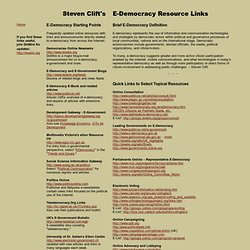
Marianne Escurat (E_Gouvernance) Global digital democracy. People power transforms the web in next online revolution. In July 2004, US cinema advertisements for Halo 2, the science fiction computer game, briefly carried the address for a website - ilovebees.com - which appeared to belong to a beekeeper who had mysteriously disappeared.
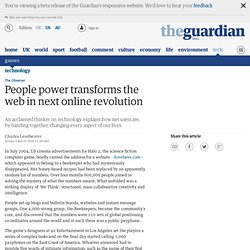
Her honey-based recipes had been replaced by an apparently random list of numbers. Over four months 600,000 people joined in solving the mystery of what the numbers meant. What unfolded was a striking display of 'We Think': structured, mass collaborative creativity and intelligence. People set up blogs and bulletin boards, websites and instant message groups. One 4,000-strong group, the Beekeepers, became the community's core, and discovered that the numbers were 210 sets of global positioning co-ordinates around the world and at each there was a public payphone.
The game's designers at 42 Entertainment in Los Angeles set the players a series of complex tasks and on the final day started calling 1,000 payphones on the East Coast of America. P2P Governance Visualization. Citizen Science Toolbox. Citizen juries aim to draw members of the community into participative processes where the community is distanced from the decision-making process or a process is not seen as being democratic.
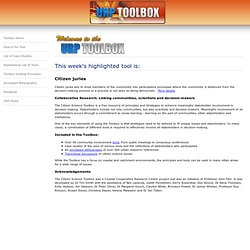
More details Collaborative Research: Linking communities, scientists and decision-makers The Citizen Science Toolbox is a free resource of principles and strategies to enhance meaningful stakeholder involvement in decision-making. Stakeholders include not only communities, but also scientists and decision-makers. Meaningful involvement of all stakeholders occurs through a commitment to social learning - learning on the part of communities, other stakeholders and institutions. One of the key elements of using the Toolbox is that strategies need to be tailored to fit unique issues and stakeholders. Included in the Toolbox: While the Toolbox has a focus on coastal and catchment environments, the principles and tools can be used in many other areas for a wide range of issues.
Resource Center » Best-of-the-Best Resources. Here is NCDD director Sandy Heierbacher’s list of what she considers the best books, guides and tools out there about dialogue, deliberation and public engagement.
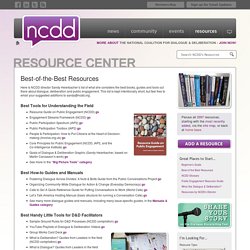
This list is kept intentionally short, but feel free to email your suggested additions to sandy@ncdd.org. Best Tools for Understanding the Field Resource Guide on Public Engagement (NCDD) goEngagement Streams Framework (NCDD) goPublic Participation Spectrum (IAP2) goPublic Participation Toolbox (IAP2) goPeople & Participation: How to Put Citizens at the Heart of Decision-making (Involve.org.uk) goCore Principles for Public Engagement (NCDD, IAP2, and the Co-Intelligence Institute) goGoals of Dialogue & Deliberation Graphic (Sandy Heierbacher, based on Martin Carcasson’s work) goSee more in the “Big Picture Tools” category Best How-to Guides and Manuals. “The internet is direct democracy.” Paul Jorion is an anthropologist who blogs about economic and financial issues.
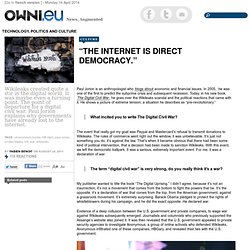
In 2005, he was one of the first to predict the subprime crisis and subsequent recession. Today, in his new book, The Digital Civil War, he goes over the Wikileaks scandal and the political reactions that came with it. He shows a picture of extreme tension, a situation he describes as “pre-revolutionary.” What incited you to write The Digital Civil War? The event that really got my goat was Paypal and Mastercard’s refusal to transmit donations to Wikileaks.
The term “digital civil war” is very strong, do you really think it’s a war? My publisher wanted to title the book “The Digital Uprising.” How the Internet Creates a New Strain of Democracy. Technology is evolving rapidly, with 500 million people spending 700 billion minutes every month on Facebook.
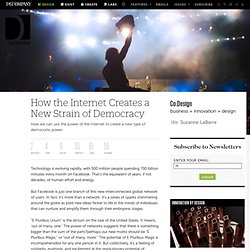
That's the equivalent of years, if not decades, of human effort and energy. But Facebook is just one branch of this new interconnected global network of users. In fact, it's more than a network. It's a series of sparks shimmering around the globe as bold new ideas flicker to life in the minds of individuals that can nurture and amplify them through their embryonic stages. "E Pluribus Unum" is the dictum on the seal of the United States. Resources by type - Innovations in Self-governance. Earth OS.
BitGov system of direct democracy through the use of sophisticated network topology. D-CENT. BitGov. Correcting Democracy with Bitgov. SEPTEMBER 20, 2013 by CHUCK GRIMMETT Your eyes pop open.
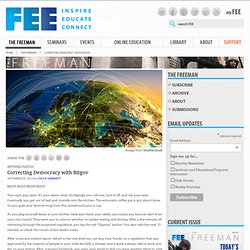
It’s your alarm clock. Grudgingly you roll over, turn it off, and rub your eyes. Eventually you get out of bed and stumble into the kitchen. The automatic coffee pot is just about done. As you plop yourself down at your kitchen table and check your tablet, you notice you have an alert from your city council. After some low-sodium bacon (which is the only kind you can buy now, thanks to a regulation that was approved by the majority of people in your state last fall), a shower, and a quick subway ride to work, you fire up your laptop.
The Bitcoin of governance could be coming soon. I left Istanbul in mid-June to join a 10-week program in Silicon Valley to solve global grand challenges through technology.
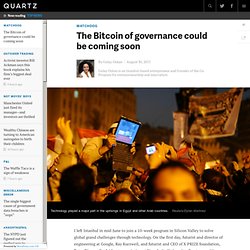
On the first day, futurist and director of engineering at Google, Ray Kurzweil, and futurist and CEO of X PRIZE foundation, Peter Diamandis, laid out our mission at Singularity University: Create a positive impact on a billion people in a decade and create disruptive innovation. The first thing that came to my mind were the demonstrations and police crackdowns I had just left behind in Turkey, and whether there was a way to disrupt this failed system of governance. I wasn’t the only one asking that question—80 of us from 38 different countries spent the summer at Singularity University’s NASA Ames Research Center to devise solutions on eight global issues: water, security, poverty, energy, environment, food, global health, and education. LiquidFeedback – Interactive Democracy. Apps for Democracy - An Innovation Contest by iStrategyLabs for the DC Government and Beyond. Echo - L'agora globale (la démocratie revue et corrigée)
Future of E-Democracy - The 50 Year Plan - Speech by Steven Clift. Join 2300 people on my e-mail announcement list here.
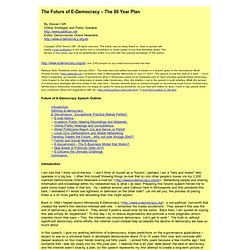
Release Note: Published online January 2002 – This extended and edited transcript is based on a speech given to the international World Futurist Society < conference held in Minneapolis, Minnesota on July 31, 2001. This speech is only the start of a “plan.” I try to share a pragmatic, yet futuristic vision of governance when e-democracy exists as an integrated part of “real” everyday representative democracy. I look forward to the time when e-democracy is simply called democracy. Also, the timeline I use in the speech is quite arbitrary. Hyperarchy.com (hyperarchy) Democracy and Holistic Politics. Co-intelligence is the capacity to live well WITH each other and life, creatively using diversity and uniqueness, consciously evolving together in partnership with nature, and consciously transforming culture.
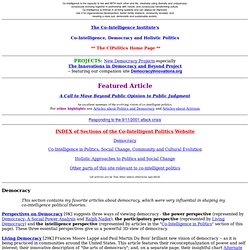
Co-intelligence is intrinsic in all living systems and can always be improved. Use it for organizational development, better family relations, community renewal, and creating a more just, democratic and sustainable society. Democracy And The Wisdom Of Crowds. “The Wisdom of Crowds: Why the Many Are Smarter Than the Few and How Collective Wisdom Shapes Business, Economies, Societies and Nations”, published in 2004, is a book by James Surowiecki. It discusses, often using anecdotes, that under certain conditions, crowds of people make better decisions than experts.
In how far can we (mis)construe this as further proving the democratic doctrine? Educating 21st Century Citizens. Beyond democracy. Digitaldemocracy / FrontPage. Greetings! This wiki was part of Tufts University's new course on Digital Democracy taught by us (Joshua Goldstein and Patrick Meier) in the Spring of 2009. We hope you find this wiki helpful.
Feel free to get in touch with us at any time. Course Description How does the Internet affect politics? See also the Course Blog and follow us on Twitter: @digidemocracy Link to YouthMap projects. E-democratielocale.info - Les réseaux au service de la participation citoyenne. Accueil - Glasnost. E. BenRayfield: Anonymous Voting With No Limit On Votes Per Person. Everyone gets as few or as many votes as they want. Write letters to your publicly elected federal, state, and local officials. A better way to govern together. OpenDemocracy. Constellation W. Important Study: Facebook Quadruples The Power Of Campaign Messages. The first large-scale experimental research on the political influence of social networks finds that Facebook quadruples the power of get-out-the-vote messages. While the single-message study produced a moderately successful boost in turnout (a 2.2% increase in verified votes), the most important finding was that 80% of the study’s impact came from “social contagion”, users sharing messages with friends who would otherwise never have seen it.
This is the first definitive proof that social networks, as opposed to television or radio, have uniquely powerful political benefits. While Facebook is unlikely return the United States to the 80 percent-plus voting rates of the 19th Century, this study is an attractive selling point to campaigns and causes looking for a way to maximize their impact for little cost or effort. Democracy 2.0. United Voices - petitions sites. Kare Anderson: Insight From Massive Social Experiment Could Sway Voting, Spending and Other Behavior. Within minutes of taking questions, Karl Rove and Howard Dean had a largely well-informed audience deep in the weeds of their conflicting, complex facts last Monday night at our Marin Speakers Series. We watched enthralled, attempting to keep up with their swift verbal combat. This was a meatier discussion than we usually get via media coverage and the truthiness-packed saturation TV ads that are blanketing the battleground states.
Our Bias Bond Us for Good and for Bad The topics they covered are innately complex, from health care to the fiscal cliff. Two women popped up early with a banner calling Rove a war criminal and were promptly escorted out. Those notions are supported by the results, announced last week, of a massive social experiment that will have far reaching affects. Can Open Government Be Gamed? If information is power, the first step to gaining power is to get the right data. Cyberdemocracy: The way to go... Loomio: democratic decision-making tool inspired by Occupy. Meet Loomio, the small-scale decision-making platform with the biggest ambitions. Technology can enable many things, both good and bad. Open Government Partnership.
Passive opinion polling using twitter. ICT4D Bibliography » Work » Casual Politics: From slacktivism to emergent movements and pattern recognition. Abstract: Collaborative e-democracy. In a collaborative e-democracy every citizen participates in the policy process, either indirectly, by delegating proxy representatives to vote on their behalf within the different policy domains, or directly, by voting on a particular issue (green arrows). 14. Collaborative democracy: the citizen’s ability to collaborate effectively. Participatory Politics Foundation. Edemocracy.
Center For Digital Democracy. #HackDemocracy. Delib - a digital democracy company. Global Democracy (GlobalDemocracy) How technology is changing politics and governance. Government 2.0.